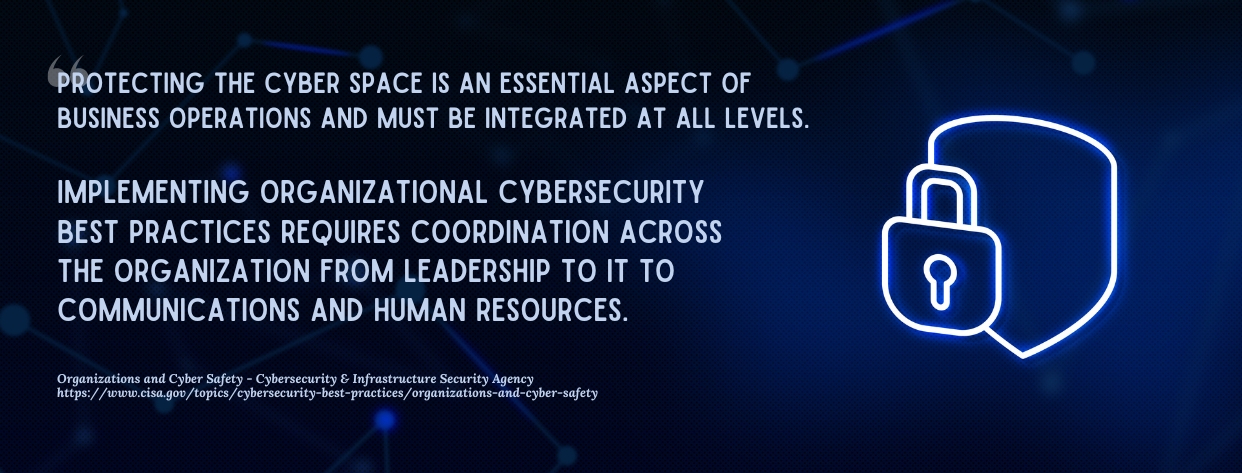Find Your Perfect School
In this digital age, people heavily rely on computer systems and other technological devices. All data, including private or personal information, confidential files, and all other data types are stored in these devices that are not insusceptible to cyber attacks! Consequently, the demand for cybersecurity experts is at an all-time high.
Take a look: Best Schools with Online Bachelor’s in Network Security
An online Cybersecurity degree program is for students with a knack for computer technologies and cyber threat solutions. This degree program features a comprehensive understanding of the different aspects of cyber security, including cyber law, digital forensics, network security, and cryptography.
Online Bachelor’s in Cyber Security programs uniquely blend theoretical knowledge and practical skills. Through engaging coursework, students delve into the intricate workings of network security, cryptography, risk management, and digital forensics. They acquire a deep understanding of cyber security principles, learn to analyze vulnerabilities, develop robust defense strategies, and investigate cyber incidents.
Quick Summarization
An online Bachelor’s in Cyber Security is an excellent academic path for making meaningful contributions to society by protecting networks and computer systems from cyber threats. Through this degree, students will be equipped with the technical knowledge and skills to open the doors to a multitude of career opportunities, where job security and growth potential abound.
Methodology
Pursuing an online bachelor’s degree in Cyber Security equips students with up-to-date strategies and the most important skills to help secure the virtual landscape. As the new breed of digital warriors, prospective students must carefully evaluate their academic options.
Take a look at the factors we considered in picking out each of our highly recommended online schools and programs:
- Flexibility and convenience in terms of scheduling and asynchronous options in the online programs allow students to balance their studies with their professional and personal commitments.
- Concentrations in specialized cyber security occupations, including penetration testing, computer forensics, information security management, and network security management and operations.
- Accreditation from respectable academic agencies, such as the National Security Agency and Department of Homeland Security that uphold the highest standards of teaching in colleges and universities in the United States.
- Classes are taught by highly skilled information security analysts and experienced faculty members with terminal degrees in the field of cyber security, ensuring exceptional instruction and guidance.
- Comprehensive and up-to-date online Cybersecurity bachelor’s degree curriculum that puts emphasis on the fundamental aspects of cyber security, covering various essential areas such as network security, cloud security, endpoint security, mobile security, IoT security, and application security.
- Easy access to a user-friendly virtual learning platform for collaborative tools, discussion forums, and course materials, as well as virtual labs and simulations for hands-on experience in secure environments.
- Robust students support services, including career counseling, technical assistance, and academic advising for students seeking to become cyber security professionals.
- Capstone projects and internships for networking opportunities and real-world experience to give future cybersecurity professionals a competitive edge upon graduation.
- Financial aid options, including scholarships, loans, grants, work-study programs, and employer tuition reimbursement programs.
To learn how we select the best schools for online Cybersecurity degree programs, visit our Methodology page.
14 Best Online BS in Cyber Security
University of Arkansas Grantham
The University of Arkansas Grantham offers a fully online Bachelor of Science in Cybersecurity designed to provide students with the technical and managerial skills needed to be successful in the world of cybersecurity.
The program’s initial coursework will lay a strong groundwork in general IT, covering key areas including SQL, security, databases, and networks, to equip students with the necessary knowledge for more advanced learning. Progressive courses emphasize identifying online threats, as well as designing and implementing computer-based processes, programs, and systems that address security requirements.
Throughout this Cyber Security program, students will have plenty of chances to improve their quantitative knowledge and skills of operations and systems, as well as learn how to effectively apply what they’ve learned to various challenges in the field.
Upon graduation, cybersecurity majors will be more than prepared to serve in various front-line information security and technology roles, including trust and safety analysts, security software developers, penetration testers, ethical hackers, cyber security analysts, digital forensics analysts, and network security engineers.
Students who have previous college or work experience can transfer up to 75% credits for the BS in Cybersecurity degree. Aside from that, the University of Arkansas Grantham has low tuition rates—one of the lowest in the country! It also provides a new laptop to all incoming and returning students for free.
This Bachelor of Science in Cybersecurity degree program’s core courses include the following:
- Operating Systems
- Systems Architecture
- Introduction to Information Systems Security
- Computer Networks
- Management Information Systems
- Security Operations
- Database Applications
- TCP/IP
- Risk Management
- Systems Analysis and Design
- Disaster Recovery
- Network Security
- Security Trends and Legal Issues
- Human Decision and Security Engineering
- Computer Forensics
- Cryptography
This university is recognized by the Council for Higher Education Accreditation (CHEA) and accredited by the Distance Education Accreditation Commission (DEAC), a recognized accrediting agency listed by the U.S. Department of Education.
Peirce College
Peirce College offers a BS in Information Technology with a concentration in Networking, Administration, and Information Security. This specialization expands students’ technical knowledge that will equip them to take rewarding careers in cybersecurity in the future.
This bachelor’s degree in cyber security will develop students’ career-oriented skills, such as creating, implementing, and integrating software, hardware, and security crucial to any organization. Coursework for this program covers topics that align with some of the most important information technology and security certification exams. Because it is a fully online program, the networking, administration, and information security concentration track will seamlessly fit into students’ busy schedules.
Program requirements for BS in Information Technology with a Networking, Administration, and Information Security concentration include the following:
- Programming Concepts
- HTML and the World Wide Web
- Database Management Systems
- Systems Analysis and Design
- Information Security and Risk Management
- Asset Security and Security Engineering
- Network Security and Security Operations
- PC Fundamentals
- Networking Fundamentals
- Introduction to Network Security
- Linux Administration, Networking, and Security
- Routing and Switching
- Ethical Hacking
Information technology majors have the option to embed employer-recognized IT and project management certifications into this degree program to earn credit for any IT certification they may already have.
Peirce College is Middle States Commission on Higher Education-accredited. MSCHE is an institutional accrediting agency that the Secretary of Education and Council for Higher Education Accreditation recognize.
University of Maryland Global Campus
The University of Maryland Global Campus offers a BS in Cybersecurity Management and Policy aimed at developing the necessary skills to prepare students for career growth in the field of cybersecurity. Through UMGC’s cybersecurity management and policy degree program, students develop the required competency for leadership positions involving the protection of data.
The BS in Cybersecurity Management and Policy degree uses a multidisciplinary approach, combining various fields, including law, management, technology, psychology, and science. Its curriculum is also designed with input from scholars, industry experts, and employers. This ensures that it combines real-world applications with theories to safeguard critical cyber infrastructures.
Its major courses include the following:
- Cybersecurity for Leaders and Managers
- Ethics in Information Technology
- Fundamentals of Networking
- Network Security
- Cybersecurity Processes and Technologies
- Cybersecurity in Business and Industry
- Cybersecurity in Government Organizations
- Cybersecurity Policy, Plans, and Programs
- Evaluating Emerging Technologies
- Advanced Information Systems Security
Through this curriculum, students will be able to develop the necessary knowledge and skills that will be taught by experienced and expert faculty members. Cybersecurity Management and Policy majors will also learn to safeguard an organization’s critical digital infrastructure, put what they’ve learned into practice with real-world applications, and develop leadership skills.
Furthermore, they will be able to effectively analyze cyber incidents to provide recovery solutions, develop cybersecurity policies, and assess the use of the right technology to realize cybersecurity objectives and goals.
Wilmington University
For those who want to become a recognized leader in cybersecurity, Wilmington University’s Bachelor of Science in Cybersecurity would be an excellent degree to pursue. This degree program in cybersecurity is a combination of academic rigor and optimum flexibility, ensuring that students will have countless career opportunities in the field.
This online degree provides students with a solid foundation in cybersecurity and gives them the option to customize their degree through a concentration in Digital Forensics. They can choose their specific areas of interest by choosing six of eight Security Elective courses:
- Electronic Discovery
- Foundations in Cyber Investigations
- Introduction Computer Forensics
- Mobile Device Security and Forensics
- Advanced Mobile and IoT Forensics
- Computer Incident Response Course
- Malware Analysis Techniques
- Network Forensics
Additionally, those who choose the Digital Forensics concentration can also earn two industry certifications, including Certified Information Systems Auditor® (CISA®), CompTIA A+, CompTIA Security+, (ISC)2 Certified Information Systems Security Professional, and CompTIA Network+.
What makes this cybersecurity program unique is that students may apply for the accelerated SCADA certificate. Once they are approved, they choose from various graduate courses to prepare for the SCADA graduate certificate, which requires students to complete 15 graduate credits and 1 IST course (IST 7100 or IST 7060) with a minimum 3.0 GPA in their graduate courses.
Wilmington University’s BS in Cybersecurity received the designation of National Center of Academic Excellence in Cybersecurity (NCAE-C) by the U.S. Department of Homeland Security and the National Security Agency since 2011.
Old Dominion University
Old Dominion University offers a Bachelor of Science in Cybersecurity to train individuals to be skilled in safeguarding online data, computer networks, and systems. Through this online program, students will be trained to identify and troubleshoot various cybersecurity issues. Aside from that, they will be able to identify and collect forensic evidence for prosecution confidently.
This is a unique multi-disciplinary program, which gives students the option of taking courses including:
- Computer Engineering
- Computer Science
- Criminal Justice
- Engineering Management
- Information Technology
- Modeling and Simulation Engineering
- Philosophy
This BS in Cybersecurity features a well-rounded curriculum that includes physics, calculus, and other computer science and engineering courses that hone students’ math skills. Students must complete 120 credit hours to finish this degree.
Here’s a sample curriculum for online students, which should give them a good idea of how many credits they can transfer to ODU.
- Cybersecurity, Technology, and Society
- Basic Cybersecurity Programming and Networking
- Introduction to Cybersecurity
- Cybersecurity Techniques and Operations
- Cyber Law
- Cybersecurity Strategy and Policy
- Cybersecurity Fundamentals
- Cybercrime and Cybersecurity
- Cryptography for Cybersecurity
- Networked Systems Security
- Information Assurance
- Cyber Defense Fundamentals
- Cyber Physical System Security
The NSA gave Old Dominion University the National Center of Academic Excellence in Cyber Operations mark from 2019 to 2024. This school has ranked among the top 10 best online cybersecurity degree programs in 2021 and 2023.
Arizona State University
With Arizona State University’s Bachelor of Science in Applied Computing with a concentration in Cybersecurity, learners will become grounded in the field of computer science and at the same time gain the necessary skills in risk assessment, information security, and analytics. Furthermore, this program will enhance students’ problem-solving and critical thinking skills by giving them plenty of opportunities to apply what they learn in school in industry and research settings.
ASU’s Cybersecurity concentration is an innovative program that builds upon the applied computing degree program. This means that students will be taught how to secure applications and networks. They will also learn about different ways of communicating complex risk issues, conquer the challenges of implementing cybersecurity controls, and have a deeper understanding of risk management fundamentals and cybersecurity governance models.
It is through real-world situations that students gain experience in protecting organizations’ digital assets from different cyber threats. This program can be taken with a second degree. Academic advisors can provide students with some much-needed guidance on creating a concurrent degree combination that best suits them.
The required course for BS in Applied Computing with a Cybersecurity concentration includes the following:
- Introduction to Computer Science
- Data Structures and Algorithms
- Introduction to Programming Languages
- Database Systems
- Computer Networks
- Systems Programming
- Secure Coding Concepts
- Wireless Networks and Security
- Network Security
- Network Forensics Analysis
- Managing Cyber Risks in Enterprise Business Processes
- Privacy, Ethics, and Compliance Issues
- Security Operations
- Computer Forensics
Syracuse University
With Syracuse University’s Bachelor of Professional Studies in Cybersecurity Administration, students will finish this degree with a level of preparedness that will allow them to meet the urgent needs of protecting information systems within organizations. The most important skills they will gain throughout the program would be detecting, responding, and preventing cyber-attacks.
Syracuse University’s BPS in Cybersecurity Administration is recognized by the National Security Agency (NSA). This ensures that its curriculum complies with industry standards. Aside from that, this degree in cybersecurity administration will provide students with the essential skills in managing technologies that safeguard information, infrastructures, and information systems.
Graduates develop an in-depth understanding of database coding and scripting, network setup, systems administration, and network protocols. They will also be able to assess vulnerabilities in organizational systems and information security matters to all stakeholders using analytical, technological, communication, critical thinking, and problem-solving skills. Moreover, cybersecurity majors will be able to successfully create solutions for security and technical concerns and at the same time, balance business concerns.
Some of the required courses for the Cybersecurity Administration program include:
- Digital Forensics for Professional Studies
- Security in the Networked Environment for Professional Studies
- Leading Issues in Information Security for Professional Studies
- Safeguarding Knowledge Management and Codification Data
- Enterprise Risk Management for Professional Studies
- Introduction to Computer Networking for Professional Studies
- Introduction to Information Security for Professional Studies
- Information Security Policy for Professional Studies
- Digital Forensics for Professional Studies
- Safeguarding Knowledge Management and Codification Data
Maryville University
Maryville University’s Bachelor of Science in Cyber Security explores and defends the digital frontier. This program is designed to give graduates an edge in a really competitive field, especially with the ever-increasing demand of businesses, governments, and other organizations.
Cyber Security majors will also gain a solid foundation in business essentials through a curriculum designed to teach them the necessary technical skills. On top of that, students will have plenty of hands-on opportunities in the university virtual lab, the Cyber Fusion Center, they can practice solving real-world cybersecurity problems.
Maryville University provides students with access to a life coach to help them improve their strengths and personalize their education. They have the option to choose from these three tracks:
- Offensive Track – allows students to explore a proactive approach to cyber security measures through ethical hacking.
- Defensive Track – students will be taught to look into the industry’s best reactive techniques to keep defenses strong and eliminate vulnerabilities.
- General Track – students are given the option to mix both tracks to get a broad overview of the cyber security field.
The university’s Cyber Fusion Center is a student-run and faculty-managed operations center that provides various free cyber security services, including computer networking, security management, and cyber defense, providing students with project-based learning. Similarly, the school partners with civic and corporate organizations to provide more hands-on involvement in real-world projects to students.
Norwich University
Through Norwich University’s Bachelor of Science in Cybersecurity, students will get access to highly relevant instruction through a flexible online classroom. Its curriculum is designed to combine core cybersecurity principles with project-based and elective courses that allow students to delve into topics and at the same time, strengthen their communication, research, analysis, and critical thinking skills.
BS in Cybersecurity students can customize their degree by picking the Computer Forensics and Vulnerability Management or Information Warfare and Security Management concentration. Its elective courses give students a way to tailor-fit their studies based on their personal and professional needs.
This program requires students to complete the following courses:
- Fundamentals of Computer Networking
- Business & Professional Writing
- Computer Programming with a Low-Level Language
- Computer Programming with a High-Level Language
- Ethics in the Modern World
- Linux Administration
- Windows Server Administration
- Relational Database Management with SQL
- Cyber Law and Cybercrime
- Introduction to Information Assurance
- Management of Organizations
Cybersecurity majors can take a Computer Forensics and Vulnerability Management concentration, which will provide them with comprehensive know-how of cybersecurity protocols and forensics processes. Its coursework will also help enhance their investigative skills through hands-on exercises in vulnerability testing and cyber investigation.
This school is accredited by the New England Commission of Higher Education (NECHE). It is also a Center of Academic Excellence in Cyber Defense Education institution, as designated by the NSA and DHS.
Saint Leo University
Saint Leo University’s College of Business offers a Bachelor of Science in Cybersecurity to teach students about the fundamentals necessary for entry-level jobs in cybersecurity. This online degree program discusses a wide range of topics, including penetration testing, ethical hacking, cyber security, computer and network protection controls, and managing the maintenance and implementation of security systems, procedures, devices, and countermeasures.
Saint Leo University has a virtual lab environment for students’ hands-on experience with security technologies and tools used by cybersecurity experts in their line of work. Through this practical experience, students will be able to fully immerse in a mock IT infrastructure and utilize real-world software tools.
Through online learning, students get access to a well-rounded education but have the freedom to customize their course of study to meet their professional and personal needs. This university allows students to complete this degree through one of their education centers, which blends traditional in-person education with a flexible schedule that matches their lifestyles.
Cybersecurity majors will gain real-world experiences through internships with Tech Data Corporation, Verizon, and Pasco County Sheriff’s Department, to name a few. They will also be able to enhance their computer programming skills in fully equipped computer networks and information assurance labs and online classrooms equipped with cutting-edge SMART Board technology.
The major requirements for this degree program in Cybersecurity include the following:
- Computer Systems
- Programming in C/C++
- Programming in Java
- System Administration
- Principles of Networking
- Fundamentals of Cybersecurity
- Penetration Testing and Counter Measures
- Python Programming
- Network Theory and Design
- Computer Architecture
- Decision Support Systems
- Operating Systems
- Systems Security
- Introduction to Internet Applications
- Database Concepts and Programming
- Systems Analysis and Design
Champlain College
Champlain College’s Bachelor of Science in Computer Networking & Cybersecurity provides learners with top-notch skills in maintaining security on the internet and in people’s digital lives. Because this school is an NSA-designated Center of Academic Excellence in Cyber Defense Education, students can expect to learn everything they need to be exceptionally equipped for national cybersecurity work.
Champlain College has a virtual infrastructure and computer labs that provide students with plenty of opportunities to have hands-on experience in solving real-world situations involving sensitive data. Students will know how to properly scan for vulnerabilities in networks and how to effectively secure shared information through web servers, databases, and integrated networks. They will also be able to practice managing and minimizing the effects of such threats, as well as develop and integrate security measures to prevent and protect computer systems against future attacks.
In this program, students will start with networking and cybersecurity courses in the first semester. This will develop the necessary skill set through projects, internships, service work for local organizations and nonprofits, and other learning opportunities. Graduates are expected to be well-versed in building, designing, and securing computing and enterprise network environments.
Some of the required courses for the BS in Computer Networking & Cybersecurity include:
- Systems Fundamentals
- Computer & Network Security
- Network Protocols
- Systems Administration & Network Services
- Enterprise & Network Security Controls
- Automation & Scripting
- Global IT & Ethics
- Law of Searching, Seizing, and Using Digital Evidence
Colorado Technical University
Colorado Technical University offers a Bachelor of Science in Computer Science-Cybersecurity Engineering designed for individuals who have an interest in developing software programs that will protect computer systems and networks from cyber-attacks and detect network breaches. With this degree, students will study new computer science and software engineering technologies, methods, tools, and models.
Students will also get to study how to analyze techniques and processes in constructing software solutions that cost-effectively implement cyber-defense strategies. Additionally, this cybersecurity engineering program provides students with hands-on programming and real-world situations to prepare them for major roles in the field.
CTU has a program called Fast Track, which is a series of modules designed to evaluate students’ knowledge of key course objectives, giving them the chance to earn college credit for what they already know. Students can pursue this degree through the school’s flexible schedules, which are designed to help them customize their class schedules.
This Cybersecurity Engineering program has ranked among the best online bachelor’s programs for nine consecutive years. It HLC-accredited and NSA/DHS-validated.
Core courses for this program include the following:
- Problem-Solving in Computer Science
- Principles of Programming Languages
- Introduction of Programming
- Fundamentals of Computer Organization and Architecture
- Python Programming
- SQL Programming
- Java Programming
- C++ Programming
- Fundamentals of Data Structure
- Introduction to Database Systems
- Computer Algorithms
- Mobile Programming
- Introduction to Parallel Computing
- Principles of Operating Systems
- Software Engineering
- Foundations of Big Data Analytics
- Fundamentals of Networking
Lewis University
Through the Bachelor of Science in Cybersecurity offered by Lewis University, students will graduate with a sense of pride knowing they can effectively secure data and safeguard systems from various kinds of cyber threats. This program offers a technical curriculum that teaches students how to assess computer software and hardware vulnerabilities, design security protections, anticipate attacks, and monitor services, and controls.
This Cybersecurity program will help students familiarize how computers process, represent, obfuscate, communicate, and store data to ensure they will be able to counterattack. Additionally, they will study the ethical and legal application of their technical know-how in today’s business environments.
The BS in Cybersecurity requires students to complete the following core courses, which is equivalent to 64 credit hours:
- Introduction to Computer Science
- Programming Fundamentals
- Introduction to Unix
- Fire Systems and Digital Forensics
- Database Systems
- Computer Organization
- Introduction to Networks
- Algorithms and Data Structures
- Operating Systems
- Advanced Cybersecurity
- Cybersecurity Essentials
- Encryption and Authentication Systems
- Legal and Ethical Issues in Computing
- Enterprise Security
- Security Assessment and Risk Management
- Cybersecurity Policy and Strategy
Lewis University offers qualified students to earn a master’s degree with an additional year of study if they pursue a Computer Science or Cybersecurity specialty. It also offers on-campus opportunities, including the ECaMS Cyber Defense Club, Prometheon Technology Club, Association of Computing Machinery (ACM), e-Sports Club, and Data Science and Artificial Intelligence Laboratory (DataSAIL).
Mercy College
Bachelor of Science in Cybersecurity students at Mercy College will be able to test, configure, and implement any new security technologies and software. Aside from that, this program will teach them to provide protection and disaster recovery to computer systems and apply the best security policy to their roles in the future.
With a BS in Cybersecurity, students will confidently and effectively monitor security systems, including intrusion detection systems and firewalls. Additionally, they will be able to identify vulnerabilities in networks and track the attack activities. They can also develop secure software components and perform security analyses. They will also be equipped to take the CISSP certification and other valuable industry certification exams upon graduation.
At Mercy College, talented students have the opportunity to complete both their bachelor’s and master’s degrees in just five years. This rewarding program produces graduates that are more than prepared to take on leadership roles in business, government, or any other organization. Interested individuals need to apply for this 4+1 program must do so before their senior year. They must choose four graduate courses that apply to both the bachelor’s degree as open electives and the master’s degree major courses.
The BS in Cybersecurity degree program requires students to complete the following foundation courses:
- Foundations of Computing
- Linux Administration
- Introduction to Cybersecurity
- Discrete Structures
- Computer Network
- Database Management Systems
- Cryptography/Computer Security
- Disaster Recovery
- Security Policy & Procedures
- Penetration and Hacking
- Network Security
- Digital Forensics
- Secure & Intelligent Program
- System Security
Mercy College is an NSA- and DHS-designated National Center of Academic Excellence in Information Assurance Education.
Top Career Options for Graduates of BS in Cyber Security
According to the (ISC)2 Cybersecurity Workforce Study in 2022, a study conducted every year to assess the size of the cybersecurity workforce and its growing shortage, there is an estimated size of “the global cybersecurity workforce of 4.7 million people.” However, there is a “worldwide gap of 3.4 million cybersecurity workers.”
An online bachelor’s in Cyber Security would be the most important first step toward fulfilling such a dream.
Here are some of the top career pathways with their corresponding median annual wages for graduates of BS in Cyber Security:
- Information Security Analyst – $102,600
- Security Engineer – $96,185
- Security Architect – $123,448
- Cyber Risk Manager – $117,243
- Chief Information Technology Officer – $320,497
- Senior Security Consultant – $164,995
- Penetration Tester – $86,000
- Computer Forensics Analyst – $102,000
- Network Security Engineer – $90,161
- Application Security Engineer – $106,198
Additional Information: Best Schools with Online Bachelor’s in Information Systems Security
Frequently Asked Questions
Why do people need to earn an online bachelor’s in cyber security?
An online BS in Cyber Security is a rigorous academic program that prepares students for crucial roles in various industries by providing them with a solid foundation in the field of cybersecurity with an emphasis on protecting an organization’s networks, computer systems, and digital assets from data breaches or cyber-attacks.
This online degree program also cultivates a diverse skill set tailored to address the various challenges that organizations face every day. It develops students’ expertise in penetration testing, digital forensics investigation, vulnerability assessment, threat intelligence analysis, and security architecture design.
How long does it take to complete an online Bachelor’s in Cyber Security?
Full-time students can complete an online Bachelor’s in Cyber Security degree in four years or about 120 credit hours. However, Cyber Security majors may be able to graduate earlier if they have college credits from a previous school, advanced placement scores, or relevant work experience.
How much does it usually cost to get an online Bachelor’s in Cyber Security?
Online bachelor’s degrees in Cyber Security programs differ in terms of cost. It also matters if the student attends school full-time or only part-time.
At Mercy College, for example, the annual tuition is $22,106. Full-time students need to pay $10,618 per term, while part-time students pay $892 per credit. Full-time students at Lewis University are required to pay $36,320 per year and part-time students pay $18,160 per semester.
Key Points to Ponder
- An online BS in Cyber Security equips students with the knowledge and skills needed to protect the world’s digital future.
- An online BS in Cyber Security will teach students about ethical hacking, digital forensics, risk management, network security, cryptography, and secure software development, which are essential skills in safeguarding networks and computer systems from cyber-attacks.
- Students of BS in Cyber Security have a wide range of career opportunities waiting for them, which include information security analyst, security architect, penetration tester, and cyber risk manager, among others.
Before you go, check on this: Best Schools with Online Bachelor’s in Information Technology















